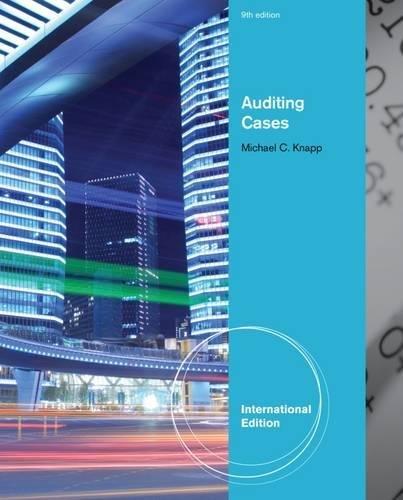Answered step by step
Verified Expert Solution
Question
1 Approved Answer
18-36 Spoilage in job costing. Jellyfish Machine Shop is a manufacturer of motorized carts for vacation resorts. Patrick Cullin, the plant manager of Jellyfish, obtains
| 18-36 Spoilage in job costing. Jellyfish Machine Shop is a manufacturer of motorized carts for vacation | ||||||||
| resorts. | ||||||||
| Patrick Cullin, the plant manager of Jellyfish, obtains the following information for Job #10 in August | ||||||||
| 2014. A total of 46 units were started, and 6 spoiled units were detected and rejected at final inspection, | ||||||||
| yielding 40 good units. The spoiled units were considered to be normal spoilage. Costs assigned prior to the | ||||||||
| inspection point are $1,100 per unit. The current disposal price of the spoiled units is $235 per unit. When | ||||||||
| the spoilage is detected, the spoiled goods are inventoried at $235 per unit. | ||||||||
| 1. What is the normal spoilage rate? | ||||||||
| 2. Prepare the journal entries to record the normal spoilage, assuming the following: | ||||||||
| a. The spoilage is related to a specific job. | ||||||||
| b. The spoilage is common to all jobs. | ||||||||
| c. The spoilage is considered abnormal. | ||||||||
| 18-37 Rework in job costing, journal entry (continuation of 18-36). Assume that the 6 spoiled units of | ||||||||||||||||||||||||||||||||||||||||||||||||||||||||||||||||||||||||||||||||||||||||||||||||||||||||||||||
| Jellyfish Machine Shops Job #10 can be reworked for a total cost of $1,800. A total cost of $6,600 associated | ||||||||||||||||||||||||||||||||||||||||||||||||||||||||||||||||||||||||||||||||||||||||||||||||||||||||||||||
| with these units has already been assigned to Job #10 before the rework. | ||||||||||||||||||||||||||||||||||||||||||||||||||||||||||||||||||||||||||||||||||||||||||||||||||||||||||||||
| Prepare the journal entries for the rework, assuming the following: | ||||||||||||||||||||||||||||||||||||||||||||||||||||||||||||||||||||||||||||||||||||||||||||||||||||||||||||||
| a. The rework is related to a specific job. | ||||||||||||||||||||||||||||||||||||||||||||||||||||||||||||||||||||||||||||||||||||||||||||||||||||||||||||||
| b. The rework is common to all jobs. | ||||||||||||||||||||||||||||||||||||||||||||||||||||||||||||||||||||||||||||||||||||||||||||||||||||||||||||||
| c. The rework is considered to be abnormal.
| ||||||||||||||||||||||||||||||||||||||||||||||||||||||||||||||||||||||||||||||||||||||||||||||||||||||||||||||
Step by Step Solution
There are 3 Steps involved in it
Step: 1

Get Instant Access to Expert-Tailored Solutions
See step-by-step solutions with expert insights and AI powered tools for academic success
Step: 2

Step: 3

Ace Your Homework with AI
Get the answers you need in no time with our AI-driven, step-by-step assistance
Get Started


